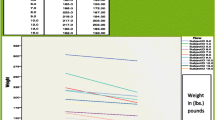Abstract
Background
Weight loss predicts a poor prognosis for cancer patients, and previous studies have implicated the ubiquitin–proteasome pathway as a major mediator of cancer-associated weight loss. The recent emergence of bortezomib, a proteasome inhibitor, now allows testing on whether proteasome inhibition is effective therapy for cancer-associated weight loss.
Methods
This study represents a subanalysis from two prior antineoplastic trials in patients with adenocarcinoma of the pancreas. The first included 46 patients with metastatic pancreatic cancer who were treated with single-agent bortezomib (intravenous doses of 1.5 or 1.3 mg/m2 on days 1, 4, 8, and 11 of a 21-day cycle). The second included 42 patients with pancreatic cancer treated with single-agent octreotide (200 or 500 μg subcutaneously three times a day). The FACT-C questionnaire provided appetite and related data for bortezomib-treated patients. Serial weight data were available from both trials. Such data from the octreotide trial were utilized for comparative purposes because the latter holds no track record in treating cancer-associated weight loss.
Results
Bortezomib- and octreotide-treated patients were roughly comparable at baseline, and neither agent demonstrated notable antineoplastic effects. FACT-C data suggested stable appetite, but high patient dropout rates invite caution in interpretation. For example, in response to “I have a good appetite,” mean scores for bortezomib-treated patients were 45 at baseline (n=42), 45 at the end of cycle 1 (n=26), and 44 at the end of cycle 2 (n=9). In contrast, weight data appeared more straightforward to interpret: direct comparisons of mean change in weight from baseline between bortezomib- and octreotide-treated patients showed no significant differences between groups.
Conclusions
These preliminary results suggest that bortezomib shows negligible favorable effects on cancer-associated weight loss in patients with metastatic pancreatic cancer. We conclude that further study of bortezomib specifically in this setting and for this indication is not warranted.

Similar content being viewed by others
References
Dewys WD, Begg C, Lavin PT, et al (1980) Prognostic effect of weight loss prior to chemotherapy in cancer patients. Eastern Cooperative Oncology Group. Am J Med 69:491–497
Wigmore SJ, Plester CE, Richardson RA, Fearon KCH (1997) Changes in nutritional status associated with unresectable pancreatic cancer. Br J Cancer 75:106–109
Terwee CB, Nieveen Van Dijkum EJ, Gouma DJ, et al (2000) Pooling prognostic studies in cancer of the pancreatic head and periampullary region: the Triple P study. Eur J Surg 166:706–712
Baracos VE, DeVivo C, Hoyle DH, Goldberg AL (1995) Activation of the ATP–ubiquitin–proteasome pathway in skeletal muscle of cachectic rats bearing a hepatoma. Am J Physiol 268(5 Pt 1):E996–E1006
Lazarus DD, Destree AT, Mazzola LM, et al (1999) A new model of cancer cachexia: contribution of the ubiquitin–proteasome pathway. Am J Physiol 277:E332–E341
Costelli P, Bossola M, Muscaritoli M, et al (2002) Anticytokine treatment prevents the increase in the activity of the ATP–ubiquitin and Ca(2+)-dependent proteolytic systems in the muscle of tumor-bearing rats. Cytokine 19:1–5
Whitehouse AS, Tisdale MJ (2003) Increased expression of the ubiquitin–proteasome pathway in murine myotubes by proteolysis-inducing factor is associated with activation of the transcription factor NfkappaB. Br J Cancer 89:1116–1122
Mikhail AT, Babcock TA, Jho DH, et al (2003) Modulation of the ubiquitin–proteasome proteolytic pathway by eicosapentaenoic acid supplementation in a model of progressive malignancy. J Parenter Enteral Nutr 27:105–109
Bossola M, Muscaritoli M, Costelli P, et al (2003) Increased muscle proteasome activity correlates with disease severity in gastric cancer patients. Ann Surg 237:384–389
Adams J, Kauffman M (2004) Development of the proteasome inhibitor Velcade. Cancer Invest 22:304–311
Burch PA, Block M, Schroeder G, et al (2000) Phase III evaluation of octreotide versus chemotherapy with 5-fluorouracil or 5-fluorouracil plus leucovorin in advanced exocrine pancreatic cancer: a North Central Cancer Treatment Group study. Clin Cancer Res 6:3486–3492
Therasse P, Arbuck SG, Eisenhauer EA, et al (2000) New guidelines to evaluate the response to treatment in solid tumors. European Organization for Research and Treatment of Cancer, National Cancer Institute of the United States, National Cancer Institute of Canada. J Natl Cancer Inst 92:205–216
Ward WL, Hahn EA, Mo F, et al (1999) Reliability and validity of the functional assessment of cancer therapy-colorectal (FACT-C) quality of life instrument. Qual Life Res 8:181–195
Author information
Authors and Affiliations
Corresponding author
Rights and permissions
About this article
Cite this article
Jatoi, A., Alberts, S.R., Foster, N. et al. Is bortezomib, a proteasome inhibitor, effective in treating cancer-associated weight loss? Preliminary results from the North Central Cancer Treatment Group. Support Care Cancer 13, 381–386 (2005). https://doi.org/10.1007/s00520-005-0787-6
Received:
Accepted:
Published:
Issue Date:
DOI: https://doi.org/10.1007/s00520-005-0787-6




